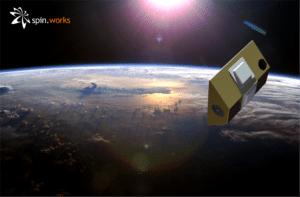ISQ TO TEST THE WORLD'S FIRST NANO-SATELLITE FOR GRAVIMETRIC STUDIES
ISQ is part of the consortium that will develop the world's first nanosatellite called uPGRADE, a 2.6 M investment dedicated to gravimetry and terpherical density studies. The consortium is part of Spin.Works (development leader), University of Texas at Austin (UTA), Iberian Nanotechnology Laboratory (INL) and University of Minho (UMinho). "The partnership was officially initiated today and one of the most interesting possible applications for this technology is the recurrent monitoring of aquifers (underground water reservoirs) existing on our Planet. This possibility will significantly improve knowledge of aquifer dynamics and make the relationship with the phenomenon of climate change." uPGRADE is one of eleven collaborative industrial R&D (Strategic Projects) projects, led by the Portuguese industry in partnership with national research institutions and the University of Texas at Austin (UTA). The qualification of uPGRADE is scheduled for early 2023, and the mission aims to develop a satellite with only 1/1000 of the volume of its predecessors and the lowest cost (about 1/100 of the cost). After the integration of the vehicle and its preliminary verification, mechanical, thermal and electrical tests will be followed at the ISQ facilities. "For ISQ this project is of the greatest relevance and attests to the quality of our services as well as the knowledge accumulated in this sector. We have been operating in the aerospace market for 15 years, with a permanent presence in the European Space Port, where we have participated in more than 90 launches. Projects such as: technology development for the Space Rider-IXV – an orbital vehicle of the European Space Agency; the Infante – 1st microsatellite Portuguese, in which isq will be responsible for ensuring quality across the entire project; the probe for Mars – cork-coated, where ISQ carried out the development and final validation tests of the demonstrator at its Castelo Branco facility, as well as the development of Earth Observation services supported in big data analytics for industrial customers", stresses Pedro Matias. The uPGRADE nano-satellite is part of the "Go Portugal – Global Science and Technology Partnerships Portugal" initiative that is part of the UT Austin Portugal Program, originally launched in 2007 to stimulate and strengthen effective collaboration between UTA and researchers, teachers, students and Portuguese companies through collaborative transatlantic R&D projects, as well as advanced training and mobility opportunities. It will include a high-precision accelerometer from INL and UMinho (which will be the main scientific instrument of the mission), and demonstrate a set of new technologies essential for future Earth observation and deep space exploration missions, including ionic propulsion and intelligent image sensors, enabling full automation of mission guidance, navigation and control. Over the course of 15 years, missions such as NASA's Gravity Recovery And Climate Experiment (GRACE) have collected precious gravimetric data for monitoring mass transit processes taking place on the Earth's surface. Its successor, GRACE Follow On (GRACE-FO) was launched in 2018 to follow this monitoring through gravimetric data, which allow, among others, 1) to quantify the loss of ice mass in places such as Greenland and West Antarctica, 2) to characterize the water cycle on regional scales (seasonal changes, drought and flood events, variation in groundwater levels) and 3) observe the gravitational changes resulting from displacements created by high-grade earthquakes. The ultra-precise accelerometers on board these satellites also allow estimating the density of the neutral thermosphere, which allows the improvement of aerodynamic friction models and the study of the Sun-Earth interaction through the measurement of crosswinds of thermoatmospheric origin. The uPGRADE satellite (μ-Prototype for Gravity Recovery and Assessment via Distributed Earth observation) will follow in the footsteps of NASA's GRACE and GRACE-FO. According to projections made by the project team, an operational constellation based on uPGRADE may perform comparable (or even higher, depending on how many satellites will be launched) to GRACE, simultaneously at a lower cost of one to two orders of magnitude. The main scientific instrument of the mission is a high-precision accelerometer based on microelectromechanical systems (MEMS), capable of measuring accelerations at the level of tens of nm/s2. These compact configurations are typical of gravimetric missions, and are intended to ensure that all non-gravitational accelerations (including atmospheric friction and the pressure of solar radiation suffered at orbital altitudes) are measured "cleanly" by the accelerometer, and clearly separated from the gravitational signal. Only after a systematic process of removal of the different sources of acceleration is it then possible to "see" the time changes in the earth's gravity field on a regional scale. More about ISQ In SPACE: https://we.tl/t-Xt2VGRYPdq

